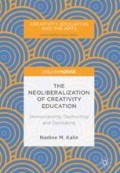Abstract
In the concluding chapter, I contrast creative destruction that runs capitalist economies with Agamben’s notion of decreation. I explore how educators, artists, and activists might reanimate their roles as creatives in this time through starving neoliberalized, entrepreneurialized, and economized forms of creativity. Proposed are alternative modes of decreation where productivity, innovation, and praxis are denied their pre-set ends toward a state of exception that allows us to begin anew in reimaging what creativity education might have been.
Access this chapter
Tax calculation will be finalised at checkout
Purchases are for personal use only
References
Agamben, G. (1999). Bartleby, or on contingency. In Potentialities: Collected essays in philosophy (D. Heller-Roazen, Ed. & Trans.) (pp. 243–271). Stanford: Stanford University Press.
Agamben, G. (2002). Difference and repetition: On Guy Debord’s films (B. Holmes, Trans.) In T. McDonough (Ed.), Guy Debord and the Situationist International: Texts and documents (pp. 313–319). Cambridge, MA: MIT Press.
Bauman, Z. (2001). The individualized society. Cambridge, MA: Polity Press.
Biesta, G. (2013). Time out: Can education do and be done without time? In T. Szkudlarek (Ed.), Education and the political: New theoretical articulations (pp. 75–88). Rotterdam: Sense Publishers and Mediterranean Journal of Educational Studies.
Britzman, D. P. (2003). Practice makes practice: A critical study of learning to teach (Revised ed.). Albany: State University of New York Press.
Derrida, J. (2007). Psyche: Inventions of the other: Volume 1. Stanford: Stanford University Press. (Original work published in 1987).
Florida, R. (2005). Cities and the creative class. New York: Routledge.
Harvie, J. (2013). Fair play: Art, performance and neoliberalism. New York: Palgrave Macmillan.
Holmes, B. (2013). Crisis theory for complex societies. In T. Bazzichelli & G. Cox (Eds.), Disrupting business: Art and activism in times of financial crisis (pp. 199–225). Brooklyn: Autonomedia.
jagodzinski, j. (2015). The challenges of art education in designer capitalism: Collaborative practices in the (new media) arts. International Journal of Art & Design Education, 34(3), 282–295.
Kalin, N. M. (2012). (de)Fending art education through the pedagogical turn. Journal of Social Theory in Art Education, 32, 42–55.
Kalin, N. M. (2013). Hosting the occupation of art education as aporia. Journal of Social Theory in Art Education, 33, 105–117.
Kalin, N. M., & Barney, D. T. (2014a). Hunting for monsters: Visual arts curriculum as agonistic inquiry. International Journal of Art and Design Education, 33(1), 19–31.
Kalin, N. M., & Barney, D. T. (2014b). Inoperative art education. Journal of Social Theory in Art Education, 34, 63–75.
De Lissovoy, N. (2015). Education and emancipation in the neoliberal era: Being, teaching, and power. New York: Palgrave Macmillan.
McRobbie, A. (2016). Be creative: Making a living in the new culture industries. Malden: Polity Press.
Robinson, K. (2016). Creative schools. New York: Penguin Books.
Rudd, T., & Goodson, I. F. (2017). Negotiating neoliberalism. Boston: Sense Publishers.
Saltman, K. J. (2014). The politics of education: A critical introduction. Boulder: Paradigm Publishers.
Schumpeter, J. A. (2003). Capitalism, socialism & democracy. New York: Routledge. (Original work published in 1943).
Stiegler, B. (2015). State of shock: Stupidity and knowledge in the 21st century (D. Ross, Trans.). Cambridge, UK: Polity Press.
Vishmidt, M. (2013). Mimesis of the hardened and alienated: Social practice as business model. In T. Bazzichelli & G. Cox (Eds.), Disrupting business: Art and activism in times of financial crisis (pp. 39–57). Brooklyn: AUTONOMEDIA.
Wagner, T. (2012). Creating innovators. New York: Scribner.
Author information
Authors and Affiliations
Rights and permissions
Copyright information
© 2018 The Author(s)
About this chapter
Cite this chapter
Kalin, N.M. (2018). Decreating Creativity Education: Yet to Be Created. In: The Neoliberalization of Creativity Education. Creativity, Education and the Arts. Palgrave Macmillan, Cham. https://doi.org/10.1007/978-3-319-71525-4_7
Download citation
DOI: https://doi.org/10.1007/978-3-319-71525-4_7
Published:
Publisher Name: Palgrave Macmillan, Cham
Print ISBN: 978-3-319-71524-7
Online ISBN: 978-3-319-71525-4
eBook Packages: EducationEducation (R0)

